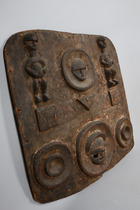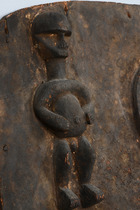Rare panel of the "ekpo" society · Nigeria, Eket · ID: 3043975
Lucien van de Velde, Antwerp, Belgium
Didier Claes, Brussels, Belgium (2007)
Christie’s, Paris, 11 December 2014, lot 153
Belgian Private Collection
Description
wood, pigment, the mask fits over the head thanks to a fibre frame (remains of it visible on the backside)
Large plank masks, like the present one, were danced at yam festivals as well as at funeral ceremonies for members of the society. They represent ancestors who have returned to the land of the living in order to sanctify the circle of life and death.
The plank masks are said to have been used by both, the “ekpe” and the “ekong” societies. The latter is a similar institution as the “ekpo” society, but was formerly mostly known for their human sacrifices, their anti-Christian attitude, and the use of poison to enforce social and political control.
As early as 1880 missionaries settled in Eket county and began fighting fiercely against the traditional religion, and particularly against their ceremonial art works, and the secret mens societies. All objects, which were seized, were then burnt. It is therefore not surprising if objects from the Eket are relatively rare.
One of the few known comparable examples of this type published in A. Lebas, Arts of Nigeria in French Private Collections, ill. 60.
The object Rare panel of the “ekpo” society with the object ID 3043975 was last part of the auction 89th Tribal Art Auction at July 7, 2018 on Zemanek-Münster Auction house and had the lot number 258.
Here you will find more objects and interesting facts about African art.
Comparing literature
Lebas, Alain (ed.), Arts of Nigeria in French Private Collections, Milan 2012, ill. 60
Publications
Claes, Patric Didier with François Neyt, Nigerian Primitivism, Brussels 2007, p. 12, ill. 2; van de Velde, Lucien, South East Nigeria, Antwerp 2009
AHDRC: 0090376
Exhibition
KAOS-Parcours des Mondes, Paris 12-16 September 2007; South-East Nigeria, Antwerp 10-11 October 2009; AFrom Benue River to Niger Delta, Antwerp, March 2012









